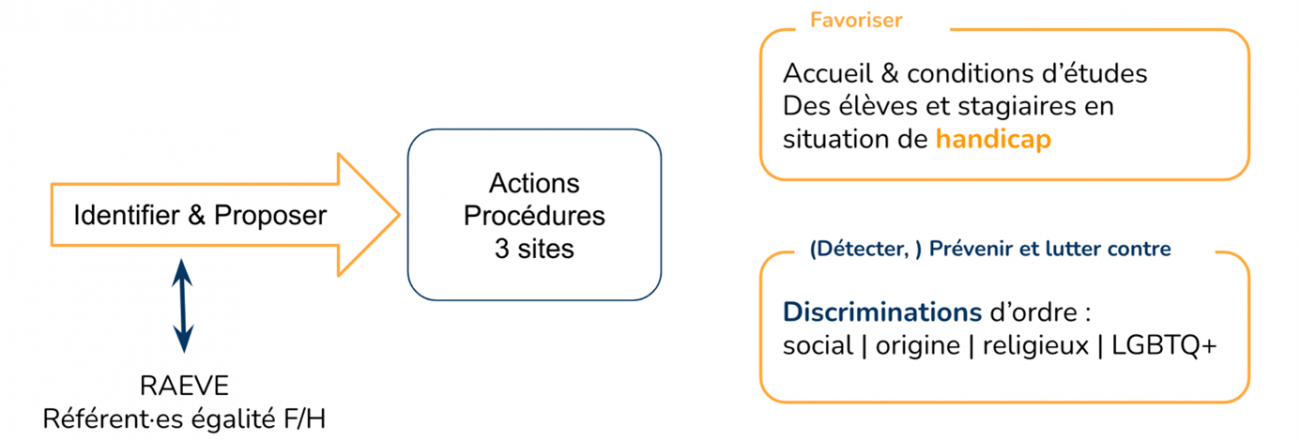Diversity And Handicaps
Welcoming students with disabilities in the best possible way, preventing, and combating all forms of discrimination are key issues for SupOptique.

Mission
Within the training component, a "Diversity-Disability" referent has been appointed. Their mission, in conjunction with the Administrative Manager for Teaching and Student Life (RAEVE), is to identify and propose procedures and systems to ensure that the school is inclusive;
- to best welcome students with disabilities
- prevent and combat all forms of discrimination (in conjunction with the gender equality referent)."

Procedures
The support procedure can be initiated at the beginning of the academic year or in the duration of studies.
The academic accommodations offered to engineering students with disabilities or health difficulties are implemented following a 5-step procedure, summarized in the figure below.
Step 1: Initial Contact
Case 1: Declaration at enrollment
Upon enrollment, engineering students can reach out to the disability services coordinator via email to initiate the support process.
A meeting can then be arranged, either in person at the Institute of Optics or remotely via video conference.
Students may also request the presence of a third party, such as a sign language interpreter, during this meeting.
Case 2: Declaration during studies
Students can contact the disability services coordinator at any time during their studies, either directly or through a faculty member, advisor, or administrative staff.
An appointment will be scheduled within 48 hours, and can be conducted in person, over the phone, or via video conference.
Step 2: Individual Meeting
The primary objective of the individual meeting is to determine if adjustments to teaching methods are necessary for the engineering student.
A list of specific needs will be established based on the student's requests, supported, if necessary, by medical certificates.
If the student wishes to communicate additional information to the teaching teams, this information will also be noted during the meeting.
Note: The additional time for exams is granted based on medical recommendations (certificate), except in exceptional cases.
The meeting also aims to inform the student of the available resources (documentary, legal, medical, etc.) that could be useful for them to continue their studies in the best conditions. Specific information can be provided regarding the procedure for Recognition of the Quality of Disabled Worker (RQTH).
Step 3: Decision and Implementation of Accommodations
The accommodations requested by the engineering student with a disability are organized, as far as possible, by the disability liaison officer in collaboration with the academic department. If necessary, the disability liaison officer may initiate a meeting with the supervisory teams and technical staff to discuss and implement the accommodations. A second meeting with the student may also be organized if needed.
A document entitled "Academic Accommodations" specifying the accommodations put in place for the current academic year is jointly drafted by the disability liaison officer, the year coordinator, and the [RAEVE].
This document is sent by email to the student for signature. The disability liaison officer, the year coordinator, and the [RAEVE] also sign the document.
Examples of Accommodations:
- Additional time for timed exams (e.g., one-third extra time).
- Authorized absences for classes, tutorials, and practical work.
- Provision of educational materials in adapted formats (font size, color, etc.).
- Authorization to use a computer during written assessments
Step 4: Dissemination of Information
The "Academic Accommodations" document is distributed by the disability liaison officer to the following recipients:
- Teaching teams
- Support teams (technical support, administrative services)
- Director of studies
This distribution is carried out via a restricted "course space" on the eCampus platform. This space is managed by the disability liaison officer and centralizes information concerning all academic accommodations put in place for the current academic year.
Step 5: Follow-up and Feedback
Each academic year, an update of the accommodations is carried out during a meeting between the student and the disability liaison officer. This meeting also serves to provide feedback on the previous year.
The dissemination procedure remains unchanged following this new meeting.
Contact
" Diversity- Disability" referee is Fabienne BERNARD.
You can contact her at the following address: fabienne.bernard@institutoptique.fr
Action
- A baseline survey was carried out in Spring 2022 involving four student cohorts.
- The results are set to be released in October 2022. For more information: https://www.institutoptique.fr/formations/cycle-ingenieur/vie-sur-les-3-campus/actions-en-collaboration-etudiantes-enseignantes.
Resources
- Ressources “Handicap - Inclusivité” (resources)






